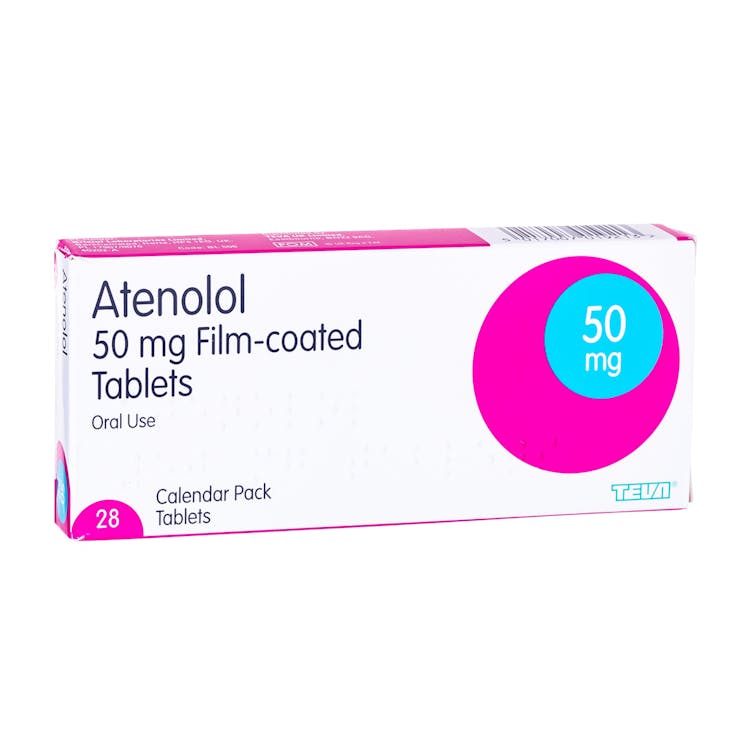Atenolol
Images for illustrative purposes only
Atenolol is a medication that is commonly prescribed to treat high blood pressure and heart disease. It is sometimes prescribed after a heart attack to alleviate the strain on the heart, helping to protect it from further damage. Atenolol is sometimes also prescribed to treat tremors and migraines.
- Beta blocker
- Slows the heart
- Reduces blood pressure
- Genuine medication
- All medication sourced in the UK
- Genuine medication
- Shipped from EU Pharmacies
More information
About Atenolol
- Atenolol is a beta blocker medication
- Atenolol blocks the effect of adrenaline on the body, reducing the heart rate and lowering the blood pressure
- When the heart is under strain or has undergone damage, atenolol protects the heart and blood vessels from further disease
- Atenolol is sometimes used to treat other conditions including benign essential tremor and migraine
- Atenolol can occasionally cause side effects including tiredness, a slow heartbeat that may make you feel sluggish, having a stomach upset or noticing that your hands and feet are cold
- It is important to read the patient leaflet for a full list of side effects and cautions.
How Does Atenolol Work?
Atenolol is a beta blocker medication. It blocks the action of beta-adrenoceptors in the body, including in the heart and blood vessels. This helps to lower the blood pressure and slows the heart rate down. Both of these actions reduce the strain on the heart.
When the strain on the heart is reduced, the risk of damage to the heart and blood vessels is reduced. This may help to protect against heart disease including chest pain from angina and heart attacks.
Because atenolol slows and steadies the heart rate, it is also a useful treatment for an irregular heartbeat.
Atenolol is also occasionally prescribed to reduce the frequency of migraines, and can also be prescribed to treat benign essential tremor.
How is Atenolol Taken?
Atenolol is available as a tablet. It should be swallowed with water, and can be taken with or without food.
It is best to take atenolol at the same time every day, as this makes it easier to remember to take it.
Dosage of Atenolol
Atenolol is available in three different strengths. Tablets are available in doses of 25mg, 50mg and 100mg. Your prescriber will advise which strength to start taking, depending on your symptoms and your past medical history.
Your dose may go up or down depending on your response to the treatment, and any side effects you experience.
Are there any Side Effects?
Like all medications, atenolol can have some side effects. The most common side effects include:
- Nausea or vomiting (feeling sick or being sick)
- Stomach upset or constipation
- Noticing a slow heartbeat
- Feeling dizzy, light-headed, or tired
- Noticing that your fingers or toes are cold
- Sweating more than usual
- Changes to your sleep pattern.
These side effects are likely to settle down, but if they persist or become troublesome you should speak to your doctor for further advice.
If you have a severe allergic reaction (anaphylaxis) including breathlessness, lip or tongue swelling, call 999 immediately.
Atenolol Warnings
Atenolol may not be suitable for everyone. You should tell your doctor if you:
- Have asthma or another condition that affects your breathing
- Have low blood pressure
- Have a slow heartbeat or heart block
- Have problems with your circulation
- Have kidney disease
- Have diabetes
- Have psoriasis
- Have myasthenia gravis (a type of muscle weakness)
- Have Prinzmetal’s angina
- Are pregnant, trying to conceive, or breastfeeding.
Some medications can interact with atenolol. You may be advised that atenolol will not suit you if you already take:
- Another blood pressure or heart rate medication including verapamil, amiodarone, nifedipine and diltiazem
- Clonidine
- Quinidine
- Medications for diabetes including insulin, as atenolol can affect blood sugar levels
- A monoaminoxidase inhibitor
- Baclofen.
If you have a general anaesthetic, you must let your doctor and anaesthetist know that you take atenolol.
Because atenolol may not suit everyone, we will complete a Consultation with you including a health questionnaire. This will ensure that the medication will be suitable for you.
A qualified prescriber will review your current medications, including any herbal remedies or supplements, to ensure that atenolol will not interact with them.
Once prescribed, atenolol will be ordered on your behalf via electronic prescription, allowing you to pick the medication up at your convenience.
Buy Atenolol
Buying Atenolol Online
Can I buy Atenolol online?
You can safely buy Atenolol online at EU Meds. You will first need to have an online consultation with a pharmacist independent prescriber before your order will be supplied. The online consultation will ensure that Atenolol is the right medication for your medical condition.
Do I need a prescription for Atenolol?
Yes, in order to purchase Atenolol you will need a valid prescription. Please note, all requests for supply of prescription medications are subject to an online clinical consultation and the decision to prescribe will be made by a doctor.

Here to help you
Our Customer Service is available Monday to Friday 9am - 4pm. If you need urgent assistance, do not use this service. Call 111, or in an emergency call 999. Visit our help section



